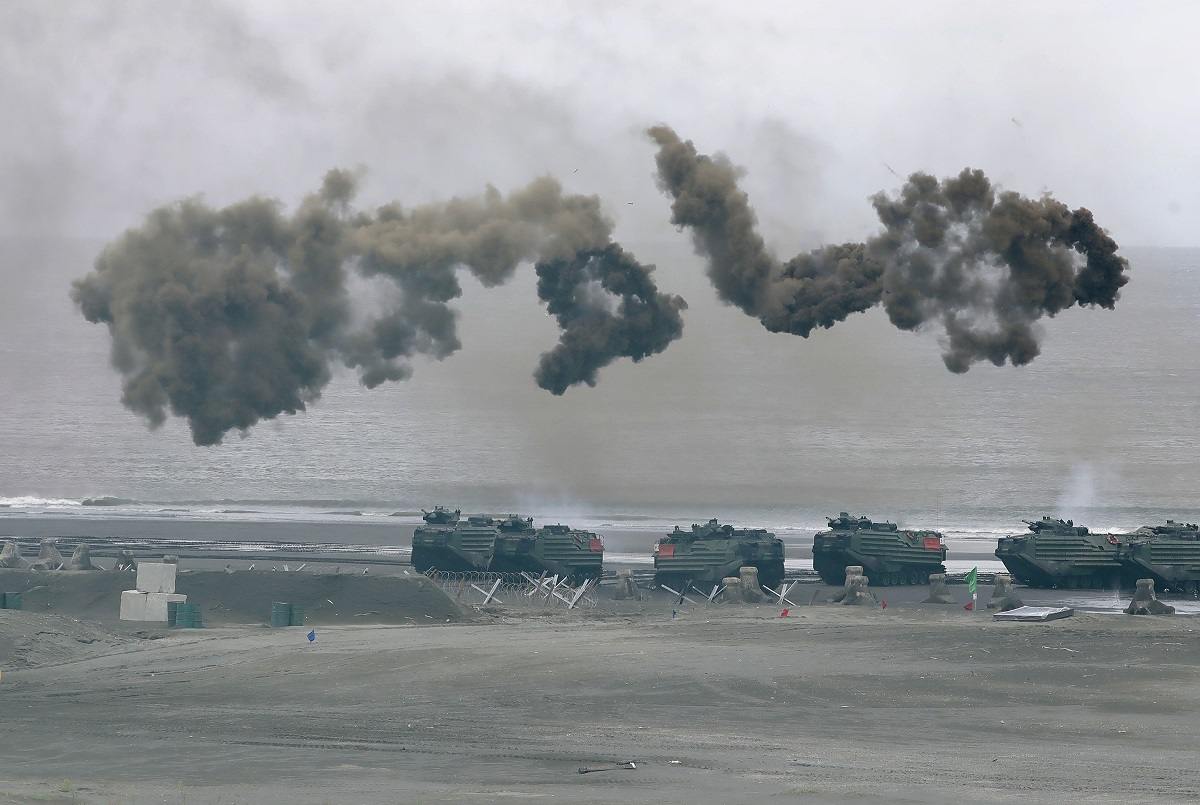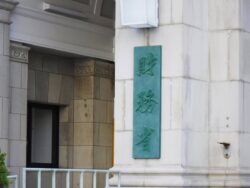
Taiwan’s military holds drills of the annual Han Kuang military exercises that simulate an anti-landing operations near the coast in New Taipei City, northern Taiwan, Thursday, July 27, 2023. Taiwan military mobilized for routine defense exercises from July 24-28. The U.S. is set to announce $345 million in military aid for Taiwan, two U.S. officials said Friday. It would be the Biden administration’s first major package drawing on America’s own stockpiles under a new policy intended to speed up military aid to help Taiwan counter China.
17:01 JST, July 30, 2023
WASHINGTON (AP) — The United States has announced $345 million in military aid for Taiwan, in what is the Biden administration’s first major package drawing on America’s own stockpiles to help Taiwan counter China.
The White House said Friday the package would include defense, education and training for the Taiwanese. Washington will send man-portable air defense systems, or MANPADS, intelligence and surveillance capabilities, firearms and missiles, according to two U.S. officials who spoke on the condition of anonymity to discuss sensitive matters.
U.S. lawmakers have been pressuring the Pentagon and White House to speed weapons to Taiwan. The goals are to help it counter China and to deter China from considering attacking, by providing Taipei enough weaponry that it would make the price of invasion too high.
While Chinese diplomats protested the move, Taiwan’s representative office in the U.S. said the administration’s decision to pull arms and other materiel from its stores provided “an important tool to support Taiwan’s self-defense.” In a statement, it pledged to work with the United States to maintain “peace, stability and the status quo across the Taiwan Strait.”
Taiwan’s Ministry of National Defense also expressed its appreciation in a statement that thanked “the U.S. for its firm commitment to Taiwan’s security.”
The package is in addition to nearly $19 billion in military sales of F-16s and other major weapons systems that the U.S. has approved for Taiwan. Delivery of those weapons has been hampered by supply chain issues that started during the COVID-19 pandemic and have been exacerbated by the global defense industrial base pressures created by Russia’s invasion of Ukraine.
The difference is that this aid is part of a presidential authority approved by Congress last year to draw weapons from current U.S. military stockpiles — so Taiwan will not have to wait for military production and sales. This gets weapons delivered faster than providing funding for new weapons.
The Pentagon has used a similar authority to get billions of dollars worth of munitions to Ukraine.
Taiwan split from China in 1949 amid civil war. Chinese President Xi Jinping maintains China’s right to take over the now self-ruled island, by force if necessary. China has accused the U.S. of turning Taiwan into a “powder keg” through the billions of dollars in weapons sales it has pledged.
The U.S. maintains a “One China” policy under which it does not recognize Taiwan’s as an independent country and has no formal diplomatic relations with the island in deference to Beijing. However, U.S. law requires a credible defense for Taiwan and for the U.S. to treat all threats to the island as matters of “grave concern.”
Getting stockpiles of weapons to Taiwan now, before an attack begins, is one of the lessons the U.S. has learned from Russia’s invasion of Ukraine, Pentagon deputy defense secretary Kathleen Hicks told The Associated Press earlier this year.
Ukraine “was more of a cold-start approach than the planned approach we have been working on for Taiwan, and we will apply those lessons,” Hicks said. Efforts to resupply Taiwan after a conflict erupted would be complicated because it is an island, she said.
China regularly sends warships and planes across the center line in the Taiwan Strait that provides a buffer between the sides, as well as into Taiwan’s air defense identification zone, in an effort to intimidate the island’s 23 million people and wear down its military capabilities.
Liu Pengyu, a spokesman for the Chinese Embassy in Washington, said in a statement that Beijing was “firmly opposed” to U.S. military ties with Taiwan. The U.S. should “stop selling arms to Taiwan” and “stop creating new factors that could lead to tensions in the Taiwan Strait,” Liu said.
"News Services" POPULAR ARTICLE
-

American Playwright Jeremy O. Harris Arrested in Japan on Alleged Drug Smuggling
-

Japan’s Nikkei Stock Average as JGB Yields, Yen Rise on Rate-Hike Bets
-

Japan’s Nikkei Stock Average Licks Wounds after Selloff Sparked by BOJ Hike Bets (UPDATE 1)
-

Japanese Bond Yields Zoom, Stocks Slide as Rate Hike Looms
-

Japan’s Nikkei Stock Average Buoyed by Stable Yen; SoftBank’s Slide Caps Gains (UPDATE 1)
JN ACCESS RANKING
-

Keidanren Chairman Yoshinobu Tsutsui Visits Kashiwazaki-Kariwa Nuclear Power Plant; Inspects New Emergency Safety System
-

Imports of Rare Earths from China Facing Delays, May Be Caused by Deterioration of Japan-China Relations
-

University of Tokyo Professor Discusses Japanese Economic Security in Interview Ahead of Forum
-

Japan Pulls out of Vietnam Nuclear Project, Complicating Hanoi’s Power Plans
-

Govt Aims to Expand NISA Program Lineup, Abolish Age Restriction

























